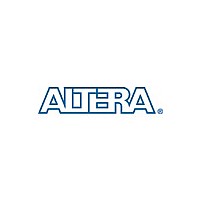EP2AGX95EF29I5N Altera, EP2AGX95EF29I5N Datasheet - Page 50

EP2AGX95EF29I5N
Manufacturer Part Number
EP2AGX95EF29I5N
Description
IC ARRIA II GX FPGA 95K 780FBGA
Manufacturer
Altera
Series
Arria II GXr
Datasheets
1.EP2AGX45CU17C6N.pdf
(96 pages)
2.EP2AGX45CU17C6N.pdf
(14 pages)
3.EP2AGX45CU17C6N.pdf
(692 pages)
4.EP2AGX45CU17C6N.pdf
(10 pages)
5.EP2AGX45CU17C6N.pdf
(88 pages)
6.EP2AGX95EF29I5N.pdf
(306 pages)
Specifications of EP2AGX95EF29I5N
Number Of Logic Elements/cells
89178
Number Of Labs/clbs
3747
Total Ram Bits
6679
Number Of I /o
372
Voltage - Supply
0.87 V ~ 0.93 V
Mounting Type
Surface Mount
Operating Temperature
-40°C ~ 100°C
Package / Case
780-FBGA
Family Name
Arria® II GX
Number Of Logic Blocks/elements
93674
# I/os (max)
372
Frequency (max)
500MHz
Operating Supply Voltage (typ)
900mV
Logic Cells
93674
Ram Bits
7025459.2
Operating Supply Voltage (min)
0.87V
Operating Supply Voltage (max)
0.93V
Operating Temp Range
-40C to 100C
Operating Temperature Classification
Industrial
Mounting
Surface Mount
Pin Count
780
Package Type
FC-FBGA
Lead Free Status / RoHS Status
Lead free / RoHS Compliant
Number Of Gates
-
Lead Free Status / Rohs Status
Compliant
Available stocks
Company
Part Number
Manufacturer
Quantity
Price
- EP2AGX45CU17C6N PDF datasheet
- EP2AGX45CU17C6N PDF datasheet #2
- EP2AGX45CU17C6N PDF datasheet #3
- EP2AGX45CU17C6N PDF datasheet #4
- EP2AGX45CU17C6N PDF datasheet #5
- EP2AGX95EF29I5N PDF datasheet #6
- Current page: 50 of 692
- Download datasheet (22Mb)
3–4
Figure 3–1. Byte Enable Functional Waveform for M9K and M144K
Arria II Device Handbook Volume 1: Device Interfaces and Integration
current data: q (asynch)
don't care: q (asynch)
contents at a0
contents at a1
contents at a2
Byte Enable Support
address
byteena
inclock
wren
data
1
All memory blocks support byte enables that mask the input data so that only specific
bytes of data are written. The unwritten bytes retain the previous written value. The
write enable (wren) signals, along with the byte enable (byteena) signals, control the
write operations of the RAM blocks.
The default value for the byte enable signals is high (enabled), in which case writing is
controlled only by the write enable signals. The byte enable registers have no clear
port. When using parity bits on the M9K and M144K blocks, the byte enable controls
all 9 bits (8 bits of data plus 1 parity bit). When using parity bits on the MLAB, the
byte-enable controls all 10 bits in the widest mode.
Byte enables operate in a one-hot fashion, with the LSB of the byteena signal
corresponding to the LSB of the data bus. For example, if you use a RAM block in ×18
mode, byteena = 01, data[8..0] is enabled and data[17..9] is disabled. Similarly, if
byteena = 11, both data[8..0] and data[17..9] are enabled. Byte enables are active
high.
You cannot use the byte enable feature when using the error correction coding (ECC)
feature on M144K blocks.
Figure 3–1
control the operations of the M9K and M144K memory blocks.
When a byte-enable bit is deasserted during a write cycle, the corresponding data byte
output can appear as either a “don’t care” value or the current data at that location.
The output value for the masked byte is controllable using the Quartus II software.
When a byte-enable bit is asserted during a write cycle, the corresponding data byte
output also depends on the setting chosen in the Quartus II software.
XXXX
XX
an
FFFF
doutn
doutn
shows how the write enable (wren) and byte enable (byteena) signals
FFFF
10
a0
FFFF
ABXX
ABFF
ABCD
01
a1
XXCD
FFCD
11
a2
ABCD
ABCD
ABFF
Chapter 3: Memory Blocks in Arria II Devices
a0
FFCD
ABFF
ABFF
December 2010 Altera Corporation
ABCD
a1
XXXX
XX
FFCD
FFCD
Memory Features
a2
ABCD
ABCD
Related parts for EP2AGX95EF29I5N
Image
Part Number
Description
Manufacturer
Datasheet
Request
R

Part Number:
Description:
CYCLONE II STARTER KIT EP2C20N
Manufacturer:
Altera
Datasheet:

Part Number:
Description:
CPLD, EP610 Family, ECMOS Process, 300 Gates, 16 Macro Cells, 16 Reg., 16 User I/Os, 5V Supply, 35 Speed Grade, 24DIP
Manufacturer:
Altera Corporation
Datasheet:

Part Number:
Description:
CPLD, EP610 Family, ECMOS Process, 300 Gates, 16 Macro Cells, 16 Reg., 16 User I/Os, 5V Supply, 15 Speed Grade, 24DIP
Manufacturer:
Altera Corporation
Datasheet:

Part Number:
Description:
Manufacturer:
Altera Corporation
Datasheet:

Part Number:
Description:
CPLD, EP610 Family, ECMOS Process, 300 Gates, 16 Macro Cells, 16 Reg., 16 User I/Os, 5V Supply, 30 Speed Grade, 24DIP
Manufacturer:
Altera Corporation
Datasheet:

Part Number:
Description:
High-performance, low-power erasable programmable logic devices with 8 macrocells, 10ns
Manufacturer:
Altera Corporation
Datasheet:

Part Number:
Description:
High-performance, low-power erasable programmable logic devices with 8 macrocells, 7ns
Manufacturer:
Altera Corporation
Datasheet:

Part Number:
Description:
Classic EPLD
Manufacturer:
Altera Corporation
Datasheet:

Part Number:
Description:
High-performance, low-power erasable programmable logic devices with 8 macrocells, 10ns
Manufacturer:
Altera Corporation
Datasheet:

Part Number:
Description:
Manufacturer:
Altera Corporation
Datasheet:

Part Number:
Description:
Manufacturer:
Altera Corporation
Datasheet:

Part Number:
Description:
Manufacturer:
Altera Corporation
Datasheet:

Part Number:
Description:
CPLD, EP610 Family, ECMOS Process, 300 Gates, 16 Macro Cells, 16 Reg., 16 User I/Os, 5V Supply, 25 Speed Grade, 24DIP
Manufacturer:
Altera Corporation
Datasheet:












